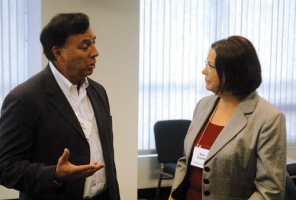Tribal Colleges Join BYU CIBER in Building International Business Curriculums

Reno Charette, right, the director of American Indian Outreach at MSU–Billings, talks with Tom Acevedo, CEO of S&K Technologies on the Salish Kootenai Reservation, during a break at the Rocky Mountain CIBER conference held at recently at MSU-Billings.PROVO, Utah – Nov 3, 2010 – For the first time ever, five tribal colleges from Native American reservations across Idaho, Montana and the Dakotas joined BYU and 28 other institutions at the Rocky Mountain CIBER Conference. Co-sponsored by BYU CIBER and dedicated to discussing the best practices in teaching international business, the event was held Sept. 30 and Oct. 1 at Montana State University–Billings.
The first half of the two-day conference introduced tribal colleges to CIBER, a program by the U.S. Department of Education that offers four-year grants of more than $1 million to Center for International Business Education and Research schools. Events of the day discussed how the resources within the RMCIBER network may meet the needs of tribal colleges' growing business programs.
For BYU Accounting Professor Erv Black, who was born on an Apache reservation near Snowflake, Ariz., the decision to invite tribal colleges was close to home.
"Tribal colleges are a relatively new phenomenon, developing in the last 15 to 20 years," says Black, a member of the CIBER advisory board. "They've come a long way, and we think our resources with CIBER might help them excel further."
A panel of university outreach coordinators and tribal college representatives discussed the need for basic business curriculum materials on financial literacy, banking fundamentals and small business management.
"Our eyes were opened," Black says. "In many ways, their needs were different than we expected."
The panel discussion was followed by a traditional Native American talking circle, where members sat shoulder-to-shoulder and passed around an eagle feather signifying whose turn it was to freely share their thoughts about the topic at hand.
"In order to work with tribal colleges, or anyone for that matter, you need to first seek to understand their culture before you can do anything for them," says Sherstin Creamer, program coordinator at BYU's Global Management Center. "It was a unique reminder of the importance of listening to and learning from others."
The second half of the conference featured presentations from educators within the network. Kelly Murphrey from Texas A&M University showcased 57 Internet tools he uses to teach international business. The tools foster curiosity about global business in students who don't have frequent opportunities to travel. Another presenter, Mary McNally from MSU–Billings, spoke on the importance of sustainability as a new form of measurement and accountability in international business.
"The purpose of CIBER is to innovate and disseminate," says Lee Radebaugh, director of the GMC. "We are always looking for better ways to teach international business, and this conference allowed creative individuals in the RMCIBER network to share their new and unique methods. Then we try to share that knowledge with other institutions."
Radebaugh, who closed the conference until next year, believes strongly in CIBER's initiatives for education and outreach.
"Everyone lives in a global economy," Radebaugh says. "We prepare students from all colleges and universities to think broadly, to realize that they are part of a larger world."
Media Contact: Sherstin Creamer (801) 422-8034
Writer: Carrie Akinaka



